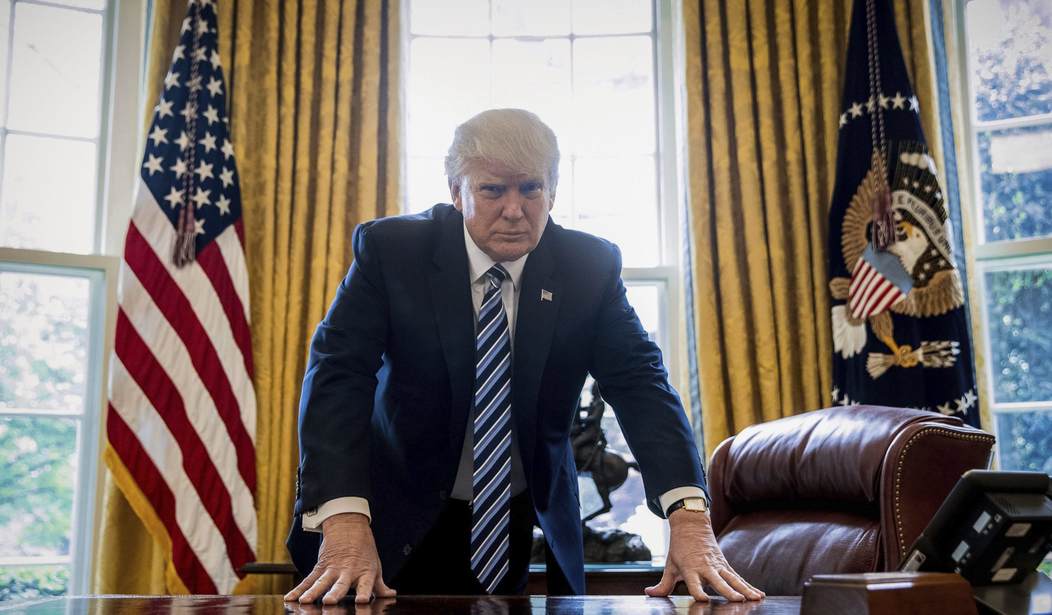On Sunday, President Donald Trump revealed his multi-step plan for countering school shootings. Trump said he would back legislation in Congress, reform the Federal Bureau of Investigation (FBI), set up a commission under Education Secretary Betsy DeVos, and more. Both Republicans and Democrats will find parts to support, and parts to attack vehemently.
“Today we are announcing meaningful actions, steps that can be taken right away to help protect students,” DeVos said on Sunday. “Far too often the focus has been only on the most contentious fights — the things that have divided people and sent them into their entrenched corners.”
The secretary insisted that Trump’s new plan involves much-needed action and does not get bogged down in ideological fights. “The plan that we’re going to advance and talk about is a pragmatic plan to dramatically increase school safety and to take steps to do so right away.”
Below are five key aspects of Trump’s plan.
1. “Hardening our schools.”
The White House proposal called for “hardening our schools” through voluntary steps to make them less vulnerable to attack. Trump suggested training and arming teachers and other school personnel, and setting up airport-style security measures.
The blueprint called for instituting security procedures like those at airports, sports stadiums, and government buildings. It suggested using Justice Department (DOJ) grants to train and vet school personnel to carry firearms “on a voluntary basis,” the Wall Street Journal‘s Michael C. Bender reported.
The White House announced that the administration will partner with states to promote “rigorous” firearms training for “specially qualified” school personnel, teaming with the DOJ to facilitate instruction. The administration also plans to support the transition of military veterans and retired law enforcement into new education careers, CNN reported.
“If schools are mandated to be gun free zones, violence and danger are given an open invitation to enter,” Trump himself tweeted Monday morning. “Almost all school shootings are in gun free zones. Cowards will only go where there is no deterrent!”
If schools are mandated to be gun free zones, violence and danger are given an open invitation to enter. Almost all school shootings are in gun free zones. Cowards will only go where there is no deterrent!
— Donald J. Trump (@realDonaldTrump) March 12, 2018
These policies echoed Trump’s speech at the Conservative Political Action Conference (CPAC) last month. In that speech, the president suggested arming gun-adept teachers and staff (vetted to make sure they care for students) and having them conceal and carry weapons, so potential shooters would not know which staff would pose a threat to their attack.
These policies inspired backlash from teachers’ unions and Democrats, but Trump’s plan for guns in schools has many virtues.
The White House also supported the STOP School Violence Act, which would authorize $50 million per year for improvements in school safety, including prevention training for teachers and students.
2. An education commission.
The White House also announced that Education Secretary DeVos will chair a new federal commission on school safety, which will study issues such as increasing the age to buy some firearms to 21, the effect violence in video games and movies has in inspiring violence in children, and identifying the best violence-prevention strategies, the Journal reported.
The commission will also investigate best practices for school building and campus security, and plans for integration and coordination of federal resources to help prevent and mitigate school shootings. Finally, the commission will investigate efforts to raise awareness of mental illness and facilitate effective treatment, CNN reported.
Some of these recommendations are wise, and some rather less so. There is no direct link between video games and violence, for example. The National Rifle Association (NRA) has firmly opposed raising the age to purchase firearms to 21, on the grounds that it violates Second Amendment rights. The NRA filed a lawsuit against Florida’s new gun law focused on that specific provision.
Even so, a commission to investigate various strategies is an excellent idea. This proposal also represented a step back for the Trump administration, as the administration was originally going to push for a higher firearm purchasing age. Perhaps the commission will realize the weaknesses of this proposal, and find new solutions to make schools safer.
Trump himself also explained a reason for waiting on the age limits. “On 18 to 21 Age Limits, watching court cases and rulings before acting,” the president tweeted. “States are making this decision. Things are moving rapidly on this, but not much political support (to put it mildly).”
….On 18 to 21 Age Limits, watching court cases and rulings before acting. States are making this decision. Things are moving rapidly on this, but not much political support (to put it mildly).
— Donald J. Trump (@realDonaldTrump) March 12, 2018
3. Background checks.
The White House also supported the “Fix NICS” bill introduced by Sen. John Cornyn (R-Texas) and Sen. Chris Murphy (D-Ct.). The bill would improve the information going to the National Instant Criminal Background Check System by offering financial incentives to federal and state authorities to comply with existing law to report criminal history records.
This bill has run into hurdles in Congress, with Sen. Ted Cruz (R-Texas) opposing it. Even so, a staffer told the Texas Tribune‘s Emma Platoff that there are now 62 sponsors of the bill.
The bill has already passed the House of Representatives, and Trump’s support further bolstered the measure. The NICS database, maintained by the FBI, came into public focus after former U.S. Air Force airman Devin Kelley opened fire at a Texas church, killing 26. The Air Force revealed after the shooting that it had failed to report the gunman’s history of domestic assault to the database, a history that should arguably have prevented him from purchasing a firearm legally.
On Monday, Trump promised, “Very strong improvement and strengthening of background checks will be fully backed by White House. Legislation moving forward.”
Very strong improvement and strengthening of background checks will be fully backed by White House. Legislation moving forward. Bump Stocks will soon be out. Highly trained expert teachers will be allowed to conceal carry, subject to State Law. Armed guards OK, deterrent!…….
— Donald J. Trump (@realDonaldTrump) March 12, 2018
4. FBI reform.
The White House also backed another reform of law enforcement agencies. The proposal calls for improvements to the FBI tip line, which was faulted for failing to act on warnings ahead of the February 14 shooting in Parkland, Fla.
Acting Deputy FBI Director David Bowdich told members of the House of Representatives that the FBI missed two tips about the Parkland gunman. He insisted, however, that the FBI’s failure on this issue had nothing to do with the investigation of Special Counsel Robert Mueller or the scandals revealing bias against Trump and support for Clinton in the FBI before and during the 2016 election.
The Parkland tragedy did reveal weaknesses in the FBI’s tip line, and Trump’s call for reform is important in this context.
5. Mental health.
The White House also suggested empowering law enforcement officials to remove firearms from the mentally ill.
As the Journal reported, “The Trump administration plan also calls on states to adopt laws allowing police, with court approval, to remove firearms from people who are a threat to themselves or others and to temporarily prevent those people from purchasing new guns.”
The plan also called for improvements to mental health systems “to help identify and treat individuals who may be a threat.”
Federal efforts to ensure that mentally ill people cannot acquire or keep a firearm may be a good idea, but implementing them would likely prove rather dicey. Proof of mental instability would have to be extremely firmly established, and even then, authorizing police to take firearms away from citizens inspire fear among legal gun owners.
A Virginia social worker claimed to have been fired from her job — not even for owning a gun, but for owning a concealed carry license. Leftist suspicion toward gun owners could have devastating effects if governments can remove weapons from mentally ill people. In most cases, the court approval might check any actions based in animus, but with opposition to same-sex marriage being branded as “hateful,” would it be possible for local officials to brand their political opponents mentally unhinged?
Despite Trump’s support for these and other steps to address gun violence, Senate Minority Leader Chuck Schumer (D-N.Y.) attacked the president’s plan. “The White House has taken tiny baby steps designed not to upset the NRA, when the gun violence epidemic in this country demands that giant steps be taken,” Schumer said in a statement.
“Democrats in the Senate will push to go further including passing universal background checks, actual federal legislation on protection orders, and a debate on banning assault weapons,” the Democrat senator concluded.
The fact that even Trump’s expansive proposal on gun violence — a much larger push than could be expected from a president backed so strongly by the NRA — received such a blatant dismissal from Democrats should speak volumes about the Leftist party’s extremism. Rather than praising many of Trump’s suggestions, Schumer attacked the whole package, suggesting his party is more interested in grandstanding on the issue than actually working to get policies enacted.









Join the conversation as a VIP Member